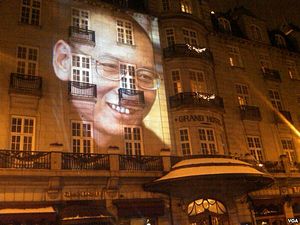Nobel Peace Prize laureate Liu Xiaobo’s tragic death while still incarcerated now ensures that he will figure in history as a martyr. And martyrs, unlike most politicians, tend to grow in power after their demise rather than fade with the years. The Communist Party was able to handle Liu while alive. It will be interesting to see what it manages to do with his final absence – a far harder proposition.
Of course, the manner and circumstances of Liu’s death, and the continuing seeming incarceration –despite never having been accused or convicted of any crimes whatsoever — of his wife Liu Xia, have been at the center of commentary. But it is right now to start remembering what gave Liu’s works their particular sting. Why was he regarded as such a threat? Adding to the conundrum, his writings were hard to access in China, and even when they were available were not widely read.
One explanation might be that, unlike his contemporaries, Liu’s work did not consistently target the Communist Party’s monopoly on power. That was the thrust of former dissidents like Wei Jingsheng, who argued powerfully in the late 1970s that after all the talk of the Four Modernizations by the Party elite, there needed to be some attention paid to the fifth – democracy. Liu’s own critique centered on something far more incendiary – the moral malaise of the Party, and its failure to live up to not the standards of others, but those it said it imposed on itself.
The essays Liu wrote through the 1990s and into the 2000s described a China disorientated by rapid economic growth and material enrichment. This was a world where cadres had moved from their ethos in an earlier era of selflessly serving the people to one where they were largely viewed as simply looking after themselves and their immediate networks. The simple underlying diagnosis Liu offered for this was that the Party was living in denial of a fundamental contradiction at its heart – paying lip service to the old ideology of socialism, but living and breathing capitalism. Only hypocrisy was able to solve this particular conundrum – and Liu was remorseless is using precisely that term to talk about the Party and its chief functionaries.
He described well the new landscape of Party power in modern China – the nightclubs and interior spaces where cadres and their business associates, mistresses, and other courtiers could meet. Anyone travelling around China in the era of its most rampant growth would have some inkling about these sorts of zones. Foreign business people, diplomats, and others were sometimes allowed access, where they could witness a sort of playground where officials belted out karaoke songs while hostesses poured out expensive wine or Chinese liquors and indulged them.
It wasn’t so much the places themselves that Liu had interest in. Everyone, even officials, needs down time and private space. It was the way in which the Party deployed a language of pure service and obligation in the daylight, and yet had allowed its chief agents to become not just materially but spiritually corrupt out of sight. Even worse, they literally had no values to look to. One proof of this was the brief veering toward something like Falungong in the late 1990s, which was reportedly popular even amongst some high level cadres. Perhaps that was why it became regarded as such a threat and why the resulting crackdown was so brutal and brisk.
The collapse of faith in Marxism-Leninism, the roll out of the hybrid but largely nonsensical idea of “market socialism,” and the massive, fast changes in Chinese society because of economic development would have been hard things for any society to deal with. But in China, Party officials had little to fall back on beside trying to build up their own wealth, and trying to at least pay off enough people to ensure their friends nominally outnumbered their enemies. There were times when China in this period felt and looked like the Wild West.
Liu offered no easy solution to this massive social malaise. He was an intellectual who was doing what intellectuals have to do – serving up what he saw as the truth without fear or favor. But at the time, the Party didn’t take the critique well. Space for loyal opposition was never really available, even in the most liberal periods of the recent past. It was unsurprising that Liu was thrown into jail – a sure sign that his analysis was most probably right.
It is deeply ironic, therefore, that only a few days after his death in July, the current chief enforcer of discipline, Wang Qishan, perhaps the most formidable and impressive Chinese politician of contemporary China, issued a coruscating attack on the crisis of hedonism, narcissism, and lack of belief amongst the elite. Beyond being published in the People’s Daily, and therefore allowed wide dissemination, Wang’s words could have been as easily issued by Liu had he still been alive.
The great British writer Dr. Samuel Johnson once said if you really want to understand yourself, don’t listen to your friends – pay attention to what your enemies say about you. In an odd way, Wang’s piece was a testament to that. Two decades after his first writings on the loss of faith and its moral consequences amongst the rulers of China, Wang and his master, Xi Jinping, are trying to finally address the issues Liu originally raised. They are in the business of constructing a faith and moral culture for the Communist Party of China. But Liu would have resolutely opposed their means to do this – enforcement and fear. His powerful criticisms therefore continue to hold. And will, until the set of fundamental questions he asked about the Chinese moral, not political, state are addressed.

































